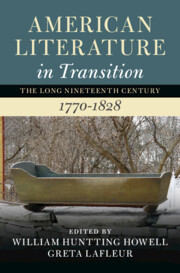Book contents
- American Literature in Transition, 1770–1828
- Nineteenth-Century American Literature In Transition
- American Literature in Transition, 1770–1828
- Copyright page
- Contents
- Contributors
- Series Preface
- Acknowledgments
- Chapter 1 Introduction
- Part I Form and Genre
- Chapter 2 The Law of Form and the Form of the Law
- Chapter 3 The Statesman’s Address
- Chapter 4 Vocabularies and Other Indigenous-Language Texts
- Chapter 5 The Genteel Novel in the Early United States
- Chapter 6 The State of Our Union
- Chapter 7 “To assume her Language as my own”
- Chapter 8 “Ambiguities and Little Secrets”
- Part II Networks
- Part III Methods for Living
- Index
Chapter 2 - The Law of Form and the Form of the Law
from Part I - Form and Genre
Published online by Cambridge University Press: 09 June 2022
- American Literature in Transition, 1770–1828
- Nineteenth-Century American Literature In Transition
- American Literature in Transition, 1770–1828
- Copyright page
- Contents
- Contributors
- Series Preface
- Acknowledgments
- Chapter 1 Introduction
- Part I Form and Genre
- Chapter 2 The Law of Form and the Form of the Law
- Chapter 3 The Statesman’s Address
- Chapter 4 Vocabularies and Other Indigenous-Language Texts
- Chapter 5 The Genteel Novel in the Early United States
- Chapter 6 The State of Our Union
- Chapter 7 “To assume her Language as my own”
- Chapter 8 “Ambiguities and Little Secrets”
- Part II Networks
- Part III Methods for Living
- Index
Summary
Expressly political literature in the period of the Revolution and early republic attempts to balance, synthesize, or overcome the contradiction between the language of universal freedom and the nascent and evolving national institutions of domination, exploitation, and general unfreedom. In the early republic’s modern, specifically capitalist form of national law, the literary vehicle is inseparable from the emergent institutional form, and this essay argues that the early republic thus initiates a considerably new phase in the nexus of rhetorical expression and social power. Through readings of the Declaration of Independence, the Articles of Confederation, the Constitution, and key texts from the ratification debate, the essay traces the invention of a state machinery uniquely suited not primarily to overt domination over citizen-subjects, but rather to their exploitation by private actors formally extrinsic to the state – an apparatus writ small, in the grammar, syntax, and distinctive diction of the primary political texts.
- Type
- Chapter
- Information
- American Literature in Transition, 1770–1828 , pp. 19 - 33Publisher: Cambridge University PressPrint publication year: 2022

